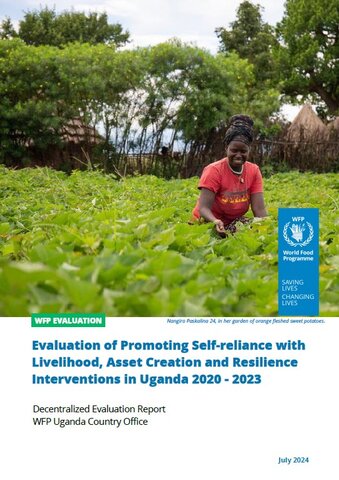
This decentralized evaluation was commissioned by the WFP Uganda Country Office to better understand the effectiveness of self-reliance and livelihoods strategies, their impact, and identify lessons learned to inform WFP programmes and contribute to the next Country Strategy Plan.
The evaluation primarily focused on the contribution of four types of self-reliance and resilience activities supporting refugees, host communities, and resident communities implemented in 21 districts in West Nile, Karamoja, and Southwest Uganda. The four interventions include: Agriculture and market support (AMS), Asset Creation and Livelihoods (ACL) and Small Livelihoods activities (LH), financial inclusion, and Pro-Resilience Action (PRO-ACT) (an climate early warning system), which were implemented across the current Uganda Country Strategy Plan (2020-2025).
Key findings & conclusions include:
- Relevance: WFP’s focus on self-reliance and resilience is well-aligned with internal, national, and joint WFP-UNHCR strategies for refugees, but the lack of common definition and evidence-based menu of programming approaches for the Ugandan context hampers effective strategy development, coordination among UN agencies, and implementation. In addition, interventions were relevant to targeted populations, though resilience focused activities were broadly more applicable to host and resident communities, than refugees.
- Effectiveness:
- WFP’s interventions were effective in contributing to self-reliance and resilience, although targeting and coverage strategies were not well defined, contributing to limited layering and synergies between Agriculture & Market Support (AMS) and Asset Creation and Livelihoods (ACL)/small livelihoods activities, though some successful examples were still noted. When looking at the specific contribution of specific activities, the evaluation could not clearly delineate individual contributions due to the lack of common definitions and indicators, lack of coordination, and limited analysis of the operational context, particularly around structural factors beyond WFP’s work.
- Across activities, WFP actively included vulnerable groups such as refugees, women, youth, and the elderly, though could have further mainstreamed people with disabilities. Particularly on gender mainstreaming, activities positively contributed to gender equality and women’s empowerment, such as household gender dynamics and women’s income generation, but interventions remained gender targeted, as opposed to gender transformative.
- Efficiency: Efficiency of individual activities was difficult to determine, but was overall influenced by funding levels. Interventions, especially Asset Creation and Livelihoods, with a weaker funding base, were more affected when there was reduced funding due to the re-allocation of unearmarked funds toward life-saving interventions.
- Sustainability: While some interventions showed promise, most lacked a clear sustainability approach and there was comprehensive exist strategy, especially to ensure the sustainability of community assets. Overall, however, WFP used and strengthened, to the extent possible, the technical capacity of Government of Uganda counterparts and governmental systems, and also actively engaged communities to enhance sustainability. Continued financial support and political willingness to allocate limited resources remains a challenge.
Based on these findings & conclusions, the evaluation made 7 overarching recommendations:
- (co) Develop a common self-reliance approach for Uganda
- Develop clear strategies for both refugees and non-refugees
- Reinforce WFP’s (political) representation
- Reinforce and formalize relationships with key partners such as GOU, UNHCR, WFP, FAO, ILO
- Divide the Asset creation and Livelihoods Activities
- Reinforce gender mainstreaming in the interventions
- Reinforce activity specific outcome monitoring and overall self-reliance/resilience evidence gathering



